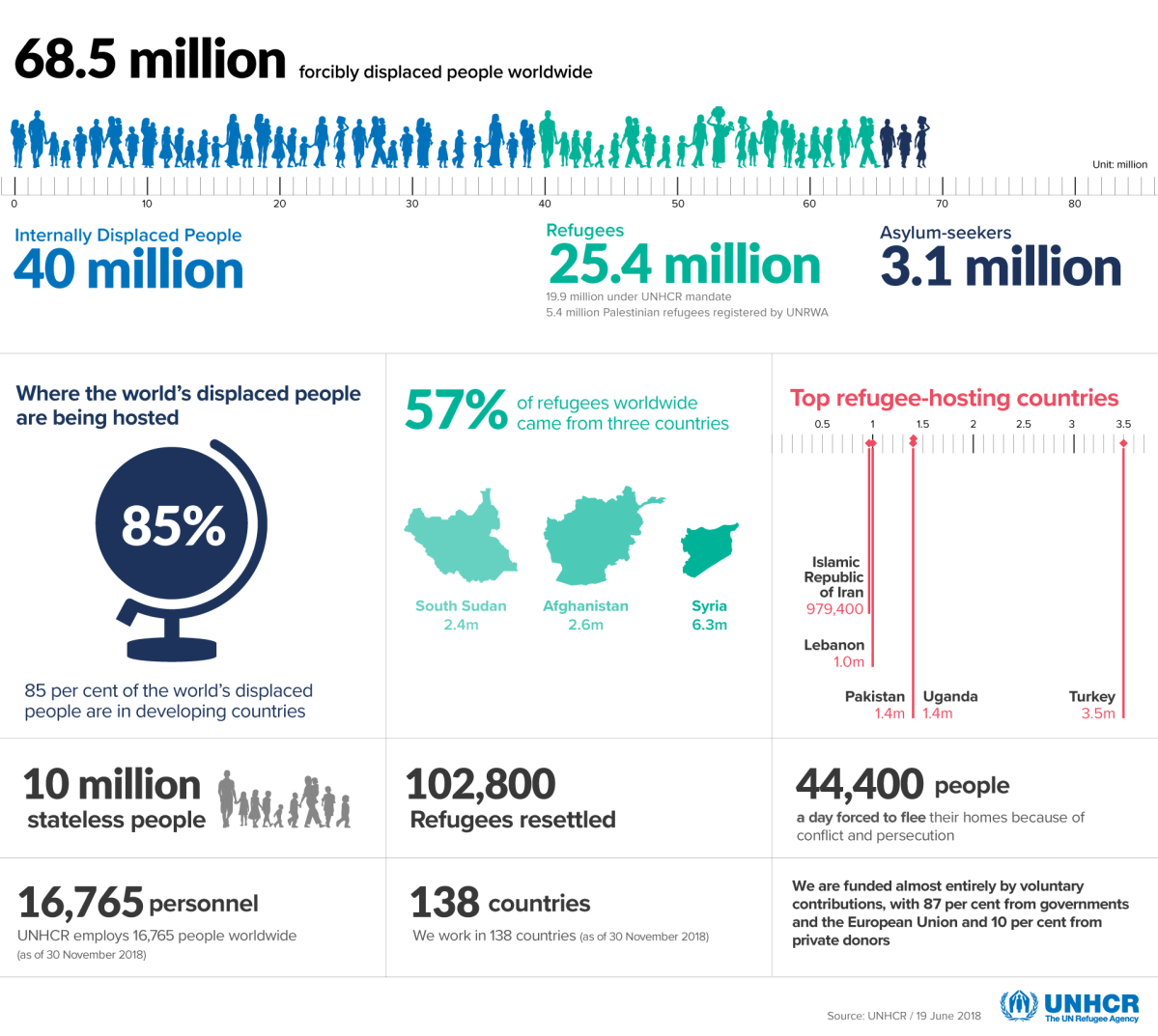The story of Christmas, which is so prominent in the public arena at this time of the year, is a story that resonates strongly with life in 2018.
Not because of its increasing commercialism. Not because of its sentimental schmaltz. Not because of the bustling shoppers, looking for last-minute gifts, nor because of the frazzled travellers, journeying to fraught meals with distant family.
No, the Christmas story resonates most strongly with those millions of people who are displaced and homeless, stateless and on the move, and seeking the safety of refuge in a foreign land. And there are millions of such people.
The United Nations High Commissioner for refugees (UNHCR) notes that “We are now witnessing the highest levels of displacement on record. An unprecedented 68.5 million people around the world have been forced from home. Among them are nearly 25.4 million refugees, over half of whom are under the age of 18. There are also an estimated 10 million stateless people who have been denied a nationality and access to basic rights such as education, healthcare, employment and freedom of movement.”
We live in a world where conflict or persecution forcibly displaces a person approximately every two seconds. That is over 44,000 people each day, leaving their homes and seeking safety elsewhere. And the countries that are taking the most responsibility for this human wave, are not the wealthy western countries (US, Canada, even Australia), and not the rapidly-developing economic tigers of the word (China, India, Brazil).
Rather, the countries receiving the highest number of refugees are Pakistan, Turkey, Lebanon, Uganda, and Iran. In fact, 85% of all refugees are being cared for in those countries whose economies, far from being robust and healthy, are still in a state of ongoing development.
At the heart of the story in each of its iterations in the New Testament, is the story of people on the move, people displaced because of governmental policy and political pressure.
The more irenic version of the story, that told by Luke (usually represented through idyllic pastoral scenes and sweetly-singing angels), tells of a widespread movement of the population that meant a pregnant Mary, accompanied by Joseph, had to travel afar and find lodging in a crowded town just as the most inconvenient time. There are historical problems with this story—identifying the census as an actual historical even, and locating it accurately in time—but it has entered the popular mindset as a real event and provides a clear and compelling picture of the holy family as refugees, because of decisions made by political authorities.
The more violent version of the story, that told by Matthew (wit a vengeful king ordering a mass slaughter of infant males), portrays a population living in fear and the unscheduled journey of the young mother Mary, along with Jospeh and their infant boy, into another country—a journey undertaken in fear and haste. There are also historical problems with this story—Matthew shapes the whole story around the biblical account of Moses, providing multiple moments of correspondence, to signal that Jesus would be “the new Moses”.
Yet, the stories live on in popular imagination—depicted on Christmas cards, sung about in carols that are piped through every shopping mall, re-enacted in a plethora of local community carols events. And the commercialised message seems to be that, as God gave a gift to us in Jesus, so we are to give to family, and friends, in ever-increasing levels of spending, with more expensive wrapped in more lavish ways, and we are to eat, drink, and be merry, with ever-increasing levels of indulgence.
Yet the real resonance of the Christmas story, for me, is that God is present in and through the events narrated in the biblical stories: God is present in times of surprised amazement, in times of struggling, in times of intense fear and hurried travel, in times of seeking the safety of refuge in another country. This is most succinctly expressed in the slogan that has gained currency in recent years: Jesus was a refugee.
And we are surrounded by people in just such a situation: 68.5 million people who have encountered an unexpected intrusion into their lives and have fled in fear; 25.4 million people whose journey away from danger now sees them living in temporary quarters, often in crowded, unsanitary, unsafe situations; 3.1 million people who have taken the step of seeking asylum in another country, because they fear that returning home would mean further persecution or, more likely, death.
These are the people who should be in our focus, at this time of the year, as we hear and see once more the Christmas story. For the gift that God gave in Jesus was to provide a voice and an example of how we are to care for those with no shelter, no food, no stability or safety. That’s the real resonance of Christmas.
The report of the UNHCR is at https://www.unhcr.org/figures-at-a-glance.html
See also https://johntsquires.wordpress.com/2018/12/19/what-can-we-know-about-the-birth-of-jesus/#


Great site! I am loving it!! Will come back again. I am taking your feeds also https://www.inc.com/justin-bariso/amazon-wikimedia-wikipedia-donation-1-million-emotional-intelligence.html
Thank you for the sensible critique. Me & my neighbor were just preparing to do a little research
about this. We got a grab a book from our area library but I think I learned more from this post.
I am very glad to see such magnificent info being shared freely out there. http://ptrot.com/johnson/31576
But wanna remark that you have a very nice website, I the style it actually stands out. http://brickshare.sawap.net/groups/turmeric-curcumin-with-bioperine-1300mg-non/
I have read so many content concerning the blogger lovers but this post is truly a good paragraph, keep it up. http://Jinwczc.com/comment/html/?30018.html
Only wanna remark on few general things, The website style and design is
perfect, the subject matter is very excellent :D. http://onbester.xyz/article.php?id=15142